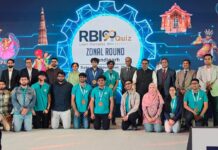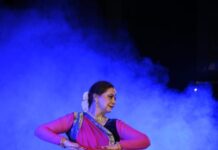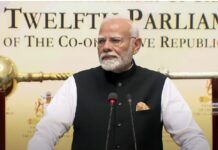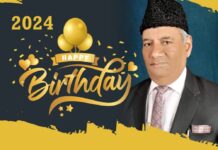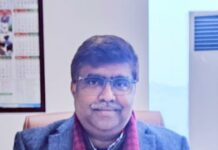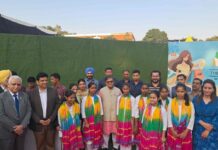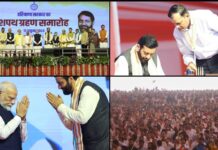Chandigarh February 1, 2023
Department of Political Science, Panjab University, organized the 7th annual Professor J C Anand Memorial lecture. The lecture was delivered by Dr Anup Chandra Pandey, Election Commission of India. The lecture was on the 70 years journey of elections in India: Experiences, Issues and Challenges’. The Lecture was presided by Professor Renu Vig, the first woman Vice Chancellor of Panjab University. Professor Pam Rajput, professor emeritus, was the guest of honour. Ms Urvashi Anand Gulati spoke about the contribution of her late father to the culture of learning in Panjab University department of political science. Also present on the occasion were the other daughter of Professor Anand, Ms Keshni Ananad Arora who honoured the dignitaries on the dais including Finance Secretary and CEO of Chandigarh Union Territory. Also present on the occasion were Ms Shruti Arora, IPS and Mr. Maneesh Chaudhry, IPS from the Anand Sisters family. All the three sisters joined IAS and reached the level of Chief Secretary in the state of Haryana.
Dr Pandey in his lecture presented an overview of the more than seven decades old journey of the electoral process in India. He underlined the role of the Election Commission of India as an independent constitutional body in the widening and deepening of India’s democracy by making the electoral process accessible, transparent, and inducement-free. Recalling the first general election which commenced on 25th October 1951, Dr Pandey referred to great difficulties the first Election Commissioner Sukumar Sen faced in the absence of electoral laws in place and an untested election machinery which was put up with great haste. Of 173 million voters, a large percentage of them voted for the first time as earlier elections held in 1937 and 1946 were based on limited franchise. Illiteracy, poverty, rural-urban divides were also great challenges to have wider and effective participation. There was only 45 percent voting and women participation was much less. The first general election earned the epitaph of having been ‘an act of faith’ by Sukumar Sen, the first Chief Election Commissioner of India. In the 2019 elections turnout was 67.4%. There were 1037848 polling booths and 8054 contestants for 543 seats. Among the winning candidates, 465 were Male; 78 were Female. In 36 States and Union Territories: only one state had a less than 60 per cent turnout. There were more than 400 parties , national, state, registered and unregistered parties were in the fray. Thus democracy has not only witnessed higher turnout and wider representation but also intense contestation among parties.
Presenting an overview, the ECI dwelt at length about the administrative measures undertaken by the Election Commission over the years using the unspecified nature of the Article 324, and with the concurrence of the parties, to not only reform the system but also to bring in women, physically challenged people, indigenous people to the polling booth. It has also been instrumental in bringing into effect the model code of conduct and enforcing it effectively to ensure that elections are free and fair. The introduction of technology like the use of electronic voting machines and creation of many apps have helped in saving paper and counting time. Of late the election commission has also been tackling the challenge of fake news, misinformation campaigns and hate speeches, especially during the election times. There has been an attempt to think of the measures that can allow missing voters to vote. The Election Commission has been appointing block level officers as well election observers to keep the elections fair. The Election Commission has mandated that the candidates must disclose their assets and also any cases that are filed against them. The commission has not hesitated in cancelling the election in case of irregularities.
Professor Renu Vig, the first Woman Vice Chancellor of Panjab University, set up in 1882, referred to the seminal contribution of the election commission of India in making India’s democracy a thriving and vibrant democracy. India is among very few post-colonial democracies with an unbroken history of holding competitive elections over such a long period of time. There has been peaceful and regular transfer of power on a periodic basis. She also recalled the democratic roots which go back to the ancient period when India had Ganrajya and elected village panchayats. She referred to the increase in the level of participation and contestation in the election due to the effort of the Election Commission which has made India’s democracy more inclusive and representative as the country celebrates the Azadi ka Amrit Mahotsava.
Professor Pam Rajput, the chief guest, in her address referred to the need to bring in more women in the electoral arena. She referred to the underrepresentation of the women in the law making bodies though she expressed satisfaction that women participation in the elections has increased. She urged the election commission to play a proactive role in checking unparliamentary language being used against women contestants and also not to call women-only polling booths as pink booths.


